

MACBETH: Act 2 Study Guide - Powered By OnCourse Systems For Education. No Fear Shakespeare. Lecture on Paradise Lost. Custom Search Lecture on Milton's Paradise Lost [The following is the text of lectures delivered, in part, in English 200 at Malaspina University-College (now Vancouver Island University) in November 1998 by Ian Johnston.
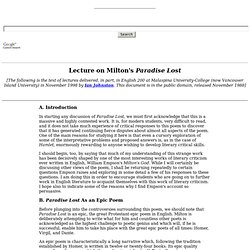
This document is in the public domain, released November 1988] A. Introduction In starting any discussion of Paradise Lost, we must first acknowledge that this is a massive and highly contested work. I should begin, too, by saying that much of my understanding of this strange work has been decisively shaped by one of the most interesting works of literary criticism ever written in English, William Empson's Milton's God. B. Before plunging into the controversies surrounding this poem, we should note that Paradise Lost is an epic, the great Protestant epic poem in English. An epic poem is characteristically a long narrative which, following the tradition established by Homer, is written in twelve or twenty-four books. C. D. Hostile critics (especially F. Beowulf Translated by Burton Raffel. BeowulfTranslations.net: Translations by Burton Raffel (1963) The Final Battle from Beowulf translated by Burton Raffel Epic 6 14.
The Battle with Grendel from Beowulf translated by Burton Raffel The Battle with Grendel. Unferth. The Arrival of the Hero from Beowulf translated by Burton Raffel The Arrival of the Hero. The Monster. The Monster Grendel from Beowulf translated by Burton Raffel The Monster Grendel 1. Primary Resources: English: Text Level: Fiction: Myths & Legends. King Arthur. Our 'Tales from Camelot' book was created over several weeks using both Literacy time and additional English lessons.
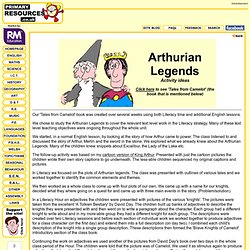
We chose to study the Arthurian Legends to cover the relevant text level work in the Literacy strategy. Many of these text level teaching objectives were ongoing throughout the whole unit. We started, in a normal English lesson, by looking at the story of how Arthur came to power. The class listened to and discussed the story of Arthur, Merlin and the sword in the stone. We explored what we already knew about the Arthurian Legends. The follow-up activity was based on my cartoon version of King Arthur. In Literacy we focused on the plots of Arthurian legends. We then worked as a whole class to come up with four plots of our own.
Depiction of Women in Chaucer’s The Canterbury Tales in Comparison Across Medieval Genres. – July 11, 2012Posted in: Articles Depiction of Women in Chaucer’s The Canterbury Tales in Comparison Across Medieval Genres By Eva Kudrnová Bachelor’s Thesis, Masaryk University, 2010 Introduction: In my thesis I focus on the analysis of presentation of women in various medieval genres and their comparison in Geoffrey Chaucer’s masterpiece The Canterbury Tales, where women appear as both narrators as well as subjects of the narrative.
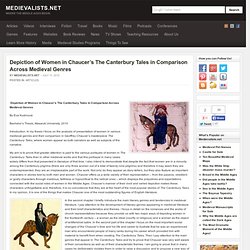
My aim is to prove that greater attention is paid to the various portayals of women in The Canterbury Tales than in other medieval works and that this portrayal in many cases widely differs from that presented in literature of that time. Works of Alexander Pope: Essay Questions And Answers For Review - Monarch Notes - HighBeam Research. Kurt Vonnegut explains drama.
I was at a Kurt Vonnegut talk in New York a few years ago.
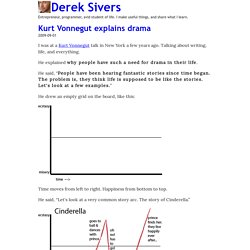
Talking about writing, life, and everything. He explained why people have such a need for drama in their life. He said, “People have been hearing fantastic stories since time began. The problem is, they think life is supposed to be like the stories. Let's look at a few examples.” He drew an empty grid on the board, like this: Time moves from left to right. He said, “Let's look at a very common story arc. It starts with her awful life with evil stepsisters, scrubbing the fireplace.
CHOOSE YOUR PATH: Print. Pearson Literacy Solutions is honored to partner with you in helping our young people to become thriving, literate global citizens ready to take on the world.

From those precious first attempts at sounding out words to energetic teens finding their voices, Pearson will be there. We invite you to check out our instructional reading comprehension & writing solutions today. Introducing Prentice Hall Writing Coach Together we can transform education by connecting personalized, assessment-driven writing programs, services, and technology that deliver improved outcomes in student performance and classroom instruction. Pearson’s research-based, innovative writing curriculum in print, digital, or blended options engages today’s digital natives while empowering teachers.
Donne and 17th-Century Poetry study questions. ENGL 204 / ENGL 331: Renaissance LiteratureDr.
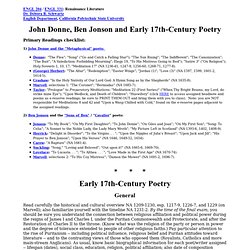
Debora B. SchwartzEnglish Department, California Polytechnic State University John Donne, Ben Jonson and Early 17th-Century Poetry Primary Readings checklist: 1) John Donne and the "Metaphysical" poets: Donne: "The Flea"; "Song" ("Go and Catch a Falling Star"); "The Sun Rising"; "The Indifferent"; "The Canonization"; "The Bait"; "A Valediction: Forbidding Mourning"; Elegy 19, "To His Mistress Going to Bed"); "Satire 3" ("On Religion"); Holy Sonnets 1, 10, 17; "Meditation 17" (NA 1236-41, 1247-9, 1256-60, 1268-71, 1277-8).
[EMLS 3.1 (May 1997): 1.1-46] 12 June 1599: Opening Day at Shakespeare's Globe. Medieval.